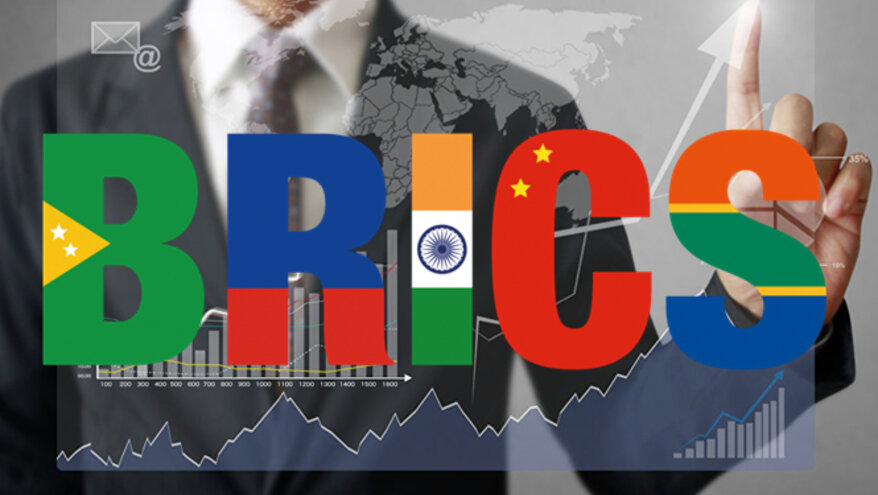BRICS Model for a New World Order
BRICS, 2 Sep 2024
Amb. Evgeny Tomikhin | BRICS Portal – TRANSCEND Media Service
28 Aug 2024 – On Jan 1, the BRICS chairmanship shifted from South Africa to the Russian Federation. Russia is going to further promote strategic partnership on the basis of continuity and consensus, increase the role of BRICS in global affairs, which is reflected in the motto of Russia’s chairmanship: “Strengthening multilateralism for just global development and security”.
BRICS is a platform for intergovernmental cooperation. It was founded in June 2006 as an informal grouping of countries by Brazil, Russia, India, and China. The original name BRIC transformed into BRICS, with the addition of South Africa in 2010. On Jan 1, Egypt, Ethiopia, Iran, Saudi Arabia and UAE became full-fledged members of BRICS.
The first BRICS Summit took place in 2009 in Yekaterinburg, Russia. Since then, BRICS has come a long way from an informal cooperation platform for sharing views on topical issues on the international agenda and has developed a vast and diverse network of cooperation and dialogue mechanisms covering all three pillars of the strategic partnership — policy and security, economy and finance, cultural and humanitarian exchanges.
BRICS is an innovative format of interaction rather than a union of individual states. BRICS partnership is based on the principles of sovereign equality, respect for the choice of individual development paths, consideration of each other’s interests and a common effort to promote the realisation of developing countries’ aspirations on the whole. At the same time, BRICS does not oppose itself to anyone and is ready to build equal and mutually beneficial cooperation with all international actors.
Such approach attracts the majority of world states. This was clearly demonstrated by the Johannesburg Summit, held on Aug 22–24, 2023, which was attended by the leaders of more than 60 countries of the Global South and, most notably, African countries. Besides, almost 30 countries, including Thailand, expressed their willingness to cooperate with the BRICS family on the terms of mutual benefit.
BRICS members have been repeatedly characterised as the fastest growing major countries. After the expansion collective share of the Group in the global economy increased from 31% to 35% by the end of 2023 based on purchasing power parity. These figures are quite telling being higher than the share of the G7 countries.
BRICS, being perceived as a leading voice of emerging markets and developing countries, has become an indispensable part of the current geopolitical landscape, providing a powerful tool for building a more fair, just and multipolar world order. It provides a unifying, positive agenda, advocates the meaningful role of the Global South in shaping a more inclusive, participatory and democratic global governance.
BRICS is more than just an association of states. It embodies a vision for a more equitable future. A vision that is not “anti-West”, but “non-West”, reflecting the priorities of the World Majority. Its collective strength lies in diversity, inclusiveness and shared values.
The future world order should be largely determined by strategic partnerships in which, like in BRICS, a spirit of openness, solidarity, equality, mutual understanding, and justice prevails over dominance and selfish interests and which are guided by the desire to make the world safe, stable and prosperous. BRICS is confidently moving forward, as clearly illustrated by the summit in Johannesburg in 2023. Member countries still have to work together, particularly in the financial section, in order to elaborate a more agile and inclusive international financial system and as they say where there’s a will, there’s a way.
_______________________________________
Evgeny Tomikhin is Ambassador of the Russian Federation to the Kingdom of Thailand.
Source: www.bangkokpost.com
Go to Original – infobrics.org
Tags: Anti-hegemony, Anti-imperialism, Anti-war, BRICS, Cooperation, Global South, Multipolar World Order, New World Order
DISCLAIMER: The statements, views and opinions expressed in pieces republished here are solely those of the authors and do not necessarily represent those of TMS. In accordance with title 17 U.S.C. section 107, this material is distributed without profit to those who have expressed a prior interest in receiving the included information for research and educational purposes. TMS has no affiliation whatsoever with the originator of this article nor is TMS endorsed or sponsored by the originator. “GO TO ORIGINAL” links are provided as a convenience to our readers and allow for verification of authenticity. However, as originating pages are often updated by their originating host sites, the versions posted may not match the versions our readers view when clicking the “GO TO ORIGINAL” links. This site contains copyrighted material the use of which has not always been specifically authorized by the copyright owner. We are making such material available in our efforts to advance understanding of environmental, political, human rights, economic, democracy, scientific, and social justice issues, etc. We believe this constitutes a ‘fair use’ of any such copyrighted material as provided for in section 107 of the US Copyright Law. In accordance with Title 17 U.S.C. Section 107, the material on this site is distributed without profit to those who have expressed a prior interest in receiving the included information for research and educational purposes. For more information go to: http://www.law.cornell.edu/uscode/17/107.shtml. If you wish to use copyrighted material from this site for purposes of your own that go beyond ‘fair use’, you must obtain permission from the copyright owner.
Join the discussion!
We welcome debate and dissent, but personal — ad hominem — attacks (on authors, other users or any individual), abuse and defamatory language will not be tolerated. Nor will we tolerate attempts to deliberately disrupt discussions. We aim to maintain an inviting space to focus on intelligent interactions and debates.
